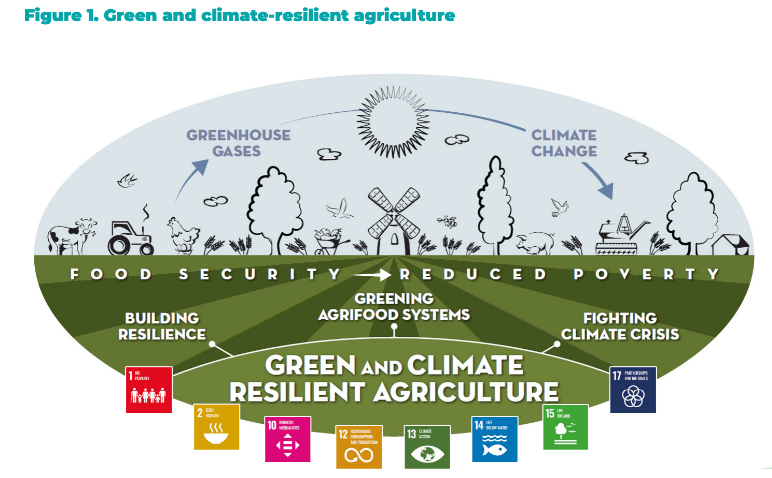Context:
The United Arab Emirates (UAE) is undertaking a transformative journey to convert desert landscapes into productive farmland through climate-smart agriculture.
About Climate Smart Agriculture (CSA):
- According to the World bank, Climate-smart agriculture (CSA) is an integrated approach to managing landscapes – cropland, livestock, forests and fisheries – that address the interlinked challenges of food security and climate change.
- Climate Smart Agriculture also known as Climate Resilient Agriculture. It is the development of agriculture under new realities of climate change.
Benefits of Climate Smart Agriculture:
- Resilience to Climate Change: Climate-smart agriculture practices build resilience in farming systems, enabling farmers to cope with the impacts of climate change, such as droughts, floods, and extreme temperatures.
- Increased Crop Yields: Efficient use of resources and adoption of climate-resilient crop varieties can lead to higher crop yields, contributing to improved livelihoods for farmers and increased income.
- Sustainable Resource Management: Climate-smart practices focus on sustainable management of natural resources, including water, soil, and biodiversity. This leads to reduced environmental degradation and conservation of ecosystem services.
- Improved Food Security: By optimizing resource use and enhancing agricultural productivity, climate-smart agriculture contributes to improved food security, ensuring a stable supply of food even under changing climatic conditions.
- Mitigation of Greenhouse Gas Emissions: Certain climate-smart agricultural practices, such as agroforestry and reduced tillage, can contribute to reducing greenhouse gas emissions from the agricultural sector, supporting climate change mitigation efforts.
- Social and Economic Benefits: Climate-smart agriculture promotes inclusivity and gender equity by empowering women farmers and vulnerable communities. It also enhances rural livelihoods by creating new income-generating opportunities and promoting sustainable rural development.
- Adoption of Innovative Technologies: Climate-smart agriculture drives innovation and the adoption of advanced technologies in farming, facilitating increased efficiency and productivity.
 Image Source: FAO
Image Source: FAO
Climate Smart Agricultural Practices:
- Crop Management: Practices include intercropping, crop rotations with legumes, using drought, wind, and flood-tolerant crop varieties, composting, mulching, and adopting organic fertilizers.
- Livestock Management: Improved feeding strategies, rotational grazing, using suitable crops to feed animals, and better livestock health and husbandry.
- Soil and Water Management: Conservation agriculture, contour planting, check dams, water storage, improved irrigation, and efficient water use.
- Agroforestry: Planting trees as windbreaks, using nitrogen-fixing trees, and incorporating fruit orchards.
- Integrated Food Energy Systems: Implementing biogas, improved stoves, solar power, and gravity-fed irrigation.
|
Challenges of Climate Smart Agriculture:
- Uncertain Weather Patterns: Climate-smart agriculture faces challenges due to the unpredictability of weather patterns and climate change impacts.
- The Global Climate Risk Index 2020, released recently, puts India seventh in the list of countries worst hit by extreme events.
- Limited Access to Resources: Small and marginal farmers often face resource constraints, such as limited access to finance, technology, and knowledge about climate-smart practices.
- Technological and Knowledge Gaps: Adopting climate-smart practices requires access to appropriate technologies and information. Many farmers lack awareness and technical know-how to implement such practices effectively.
- Institutional Barriers: Weak institutional support, inadequate policies, and governance issues can hinder the scaling up of climate-smart agriculture initiatives.
- Financial Constraints: Climate-smart agricultural practices often require initial investments in new technologies and infrastructure. Lack of financial resources can hinder farmers’ ability to adopt these practices, especially in low-income regions.
- Adaptation and Local Context: Climate-smart agriculture practices need to be tailored to local contexts and agro-ecological zones. What works in one region may not be suitable for another, necessitating region-specific approaches and adaptations.
Government Initiatives for Climate Smart Agriculture:
- National Innovation on Climate Resilient Agriculture (NICRA):
- Launched in 2011 by the Indian Council of Agricultural Research (ICAR).
- Aims: To increase the resilience of Indian agriculture, including crops, animals, and fisheries, to climate variability and change.
- National Action Plan on Climate Change (NAPCC): It launched in 2008 to mitigate and adapt to the adverse impact of climate change. It includes various “National Missions” focusing on climate change awareness, adaptation and mitigation, energy efficiency, and natural resource conservation.
- National Mission on Sustainable Agriculture (NMSA): It is one of the eight Missions under the NAPCC seeks to address issues regarding ‘Sustainable Agriculture’ in the context of risks associated with climate change by devising appropriate adaptation and mitigation measures.
- National Adaptation Fund for Climate Change (NAFCC): It was established in 2015 to meet the cost of adaptation to climate change for the State and Union Territories of India that are particularly vulnerable to the adverse effects of climate change.
- Climate-Smart Villages (CSV): CSV is an institutional strategy to implement and promote CSA at the local level, enhancing farmers’ ability to adapt to climate change. CSVs undertake a portfolio of actions to address climate challenges, covering various farm activities.
- Pradhan Mantri Krishi Sinchayee Yojna (PMSKY): Launched to prioritize water conservation and management in agriculture, PMSKY aims to expand irrigated areas.
- It focuses on “More crop per drop” by offering end-to-end water solutions, from source generation to delivery networks.
|
Way Ahead for Climate Smart Agriculture:
- Climatic Risk Assessment: Identifying specific climatic risks is crucial, as different farms face varying challenges.
- Tailored approaches are needed, considering factors like water shortages or frequent flooding.
- Access to Technologies: Ensuring access to climate-smart technologies is vital for small-scale farmers. Bridging the gender gap and reducing greenhouse gas emissions through better fertilizer use, water management, and livestock practices are essential.
- Enabling Policy Integration: Governments must design and implement policies that support CSA and incorporate it into national agricultural strategies and plans.
- Promoting Knowledge and Capacity Building: Encourage knowledge-sharing and build capabilities among farmers, extension workers, researchers, and policymakers through training programs and digital technology.
- Research and Development: Invest in R&D to understand climate change effects on agriculture and develop climate-resilient crop varieties, innovative cropping systems, and climate information services.
- Advancing Climate-Smart Livestock Production: Promote sustainable livestock management practices, such as improved feed efficiency, better waste management, and using climate-resilient cattle breeds.
News Source: The Hindu
To get PDF version, Please click on "Print PDF" button.
 Image Source: FAO
Image Source: FAO